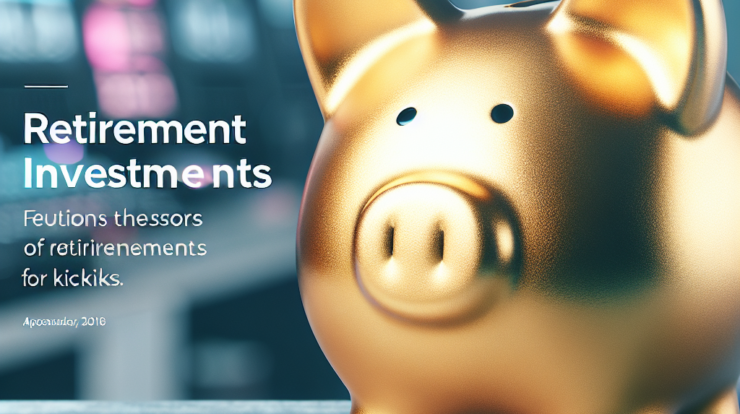
Are you an engineer who is starting to think about retirement and wondering how to make the most of your savings? Look no further! In this article, we will explore the world of retirement investments specifically tailored for engineers like you. Whether you’re a civil engineer, a mechanical engineer, or an electrical engineer, we will guide you through the various investment options available to help you secure a comfortable and financially stable retirement. So sit back, relax, and let us show you how to make your retirement dreams a reality!
Retirement Investments for Engineers
Understanding the Importance of Retirement Planning
Retirement planning is a crucial aspect of financial management that engineers should not overlook. As an engineer, you dedicate your time and energy to your work, so it’s essential to ensure that you have a stable and secure future after retirement. Retirement investments allow you to grow your assets and provide for your financial needs when you are no longer working. By starting early and making informed decisions, you can set yourself up for a comfortable retirement.
Factors to Consider for Retirement Investments
When considering retirement investments, engineers need to take several factors into account. Firstly, your risk tolerance is an essential element to consider. Different investment options carry varying levels of risk, and it’s crucial to align your investment strategy with your risk tolerance. Additionally, your investment goals play a significant role in determining the type of investments that will suit your needs. For example, if you are looking for higher returns, you may consider more aggressive investment options, whereas if you prioritize stability and preservation of capital, conservative investments may be your preference. Finally, it’s crucial to be mindful of your time horizon, as the longer you have until retirement, the more time there is for your investments to grow.
Diversifying Investment Portfolio for Engineers
Diversification is a key principle in retirement investing, and it holds equal importance for engineers. By diversifying your investment portfolio, you reduce the risk of losing all your capital if one asset class underperforms. Engineers should consider diversifying their investments across various asset classes such as stocks, bonds, real estate, and mutual funds. Each asset class possesses its own risk and return characteristics, and by spreading your investments across multiple classes, you can mitigate risk and potentially enhance your overall returns.
Traditional vs. Roth Individual Retirement Accounts (IRAs)
When it comes to retirement investing, engineers have the option to contribute to both traditional and Roth Individual Retirement Accounts (IRAs). Traditional IRAs allow you to make pre-tax contributions, reducing your taxable income in the year of contribution. However, withdrawals during retirement are subject to income tax. On the other hand, Roth IRAs require after-tax contributions, but withdrawals are generally tax-free. The choice between traditional and Roth IRAs depends on your financial circumstances and anticipated tax bracket during retirement. Consulting with a financial advisor can help you determine which option is more suitable for your specific situation.
Maximizing Employer-Sponsored Retirement Plans
As an engineer, you may have access to employer-sponsored retirement plans, such as 401(k)s or 403(b)s. These plans offer significant advantages, including employer matches on contributions and potential tax benefits. Engineers should aim to maximize their contributions to these plans to take full advantage of the employer match and the tax-deferred growth. It’s crucial to educate yourself on the specifics of your employer’s retirement plan, including contribution limits, investment options, and vesting schedules, to make the most informed decisions regarding your retirement investments.
Investing in Mutual Funds for Retirement
Mutual funds provide engineers with an excellent opportunity to invest in a diversified portfolio managed by professionals. By investing in mutual funds, you gain access to a broad range of assets, including stocks, bonds, and sometimes real estate, without the need to directly manage individual investments. Engineers can choose from a variety of mutual funds catered to their risk tolerance and investment goals. It’s essential to carefully review the fund’s prospectus, which provides valuable information on the fund’s investment objectives, risks, and fees. This information will assist you in selecting the most suitable mutual funds for your retirement investments.
Exploring Stocks and Bonds as Retirement Investments
Engineers with a higher risk tolerance and a longer time horizon may consider investing in stocks and bonds to grow their retirement assets. Stocks offer the potential for high returns, but they also carry higher risks. Investing in individual stocks requires careful research and analysis to select companies with strong growth potential. Bonds, on the other hand, are generally viewed as more conservative investments, providing a steady stream of income and principal preservation. Engineers can consider a balanced approach by investing in a mix of stocks and bonds to achieve a well-diversified portfolio that balances risk and return.
Real Estate Investment Options for Engineers in Retirement
real estate can be an attractive investment option for engineers seeking to diversify their retirement portfolio. Whether investing in rental properties, real estate investment trusts (REITs), or real estate crowdfunding platforms, there are many ways to participate in the real estate market. Rental properties can generate consistent cash flow, while REITs offer the benefits of professional management and the potential for dividends. Real estate crowdfunding platforms allow engineers to invest in real estate projects with lower capital requirements. However, it’s essential to thoroughly research and understand the risks associated with each real estate investment option before committing your retirement funds.
The Role of Annuities in Retirement Planning
Annuities can play a significant role in retirement planning for engineers. Annuities provide a guaranteed stream of income during retirement, which can help ensure financial stability. Engineers can choose from various types of annuities, including fixed annuities, variable annuities, and indexed annuities, each with its own unique features and benefits. Fixed annuities provide a fixed rate of return, while variable annuities allow for investment growth potential. Indexed annuities offer a combination of guaranteed returns and potential market-linked growth. Engineers should consider their risk tolerance and income needs when evaluating annuities as part of their retirement investment strategy.
Considering Social Security Benefits in Retirement
Engineers should also consider the role of Social Security benefits in their retirement planning. Social Security provides a steady source of income during retirement, which can supplement other retirement investments. The age at which you start claiming Social Security benefits can significantly impact the amount you receive each month. While you can claim benefits as early as age 62, delaying your claim until full retirement age or even beyond can result in higher monthly benefits. Engineers should carefully analyze their financial situation and consult with a financial advisor to determine the optimal time to claim Social Security benefits.
In conclusion, retirement planning is a crucial aspect of financial management for engineers. By understanding the importance of retirement planning, considering various factors, diversifying investment portfolios, and exploring different investment options, engineers can set themselves up for a secure and comfortable retirement. Maximizing contributions to employer-sponsored retirement plans, investing in mutual funds, stocks, bonds, real estate, annuities, and considering Social Security benefits all play essential roles in engineering a successful retirement. Start early, educate yourself, and seek professional guidance to make informed decisions that align with your financial goals. Your future self will thank you for taking the necessary steps to secure your retirement.









